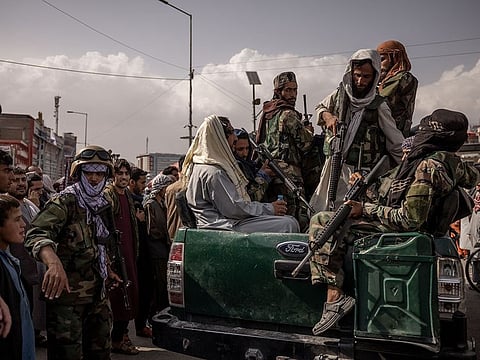Chaos in Kabul: Let us not forget how it all began
Neither Afghanistan or Iraq are in a better place, two decades after Bush’s adventurism

Many today are deeply engrossed in the events surrounding the US withdrawal and subsequent advances by the Taliban in Afghanistan. Images echoing of the hastily arranged US departure from Vietnam have drawn comparison as Afghans working with US forces have by the thousands dashed to the airport. Some have tragically died clinging on to the wheels of the aircraft as it took off.
Through it all, it is easy to forget how it all began, an event that should never have had happened. Although I had disagreed with many of the former US President Donald Trump’s foreign policies, there was one statement he made that sounded an agreeable cord. If I recall correctly, he said that it was wrong for America to go into Afghanistan and Iraq. Yet in the past two decades, efforts to untangle themselves from the mess found the Americans getting deeper and deeper in the morass.
But following the Sep. 11, 2001 attack, American emotions amid the shock of the carnage in their backyard had reached a feverish pitch. “You’re with us or without us,” bellowed President George W. Bush. He went on to promise ‘infinite justice’, language that somehow disrupted my moment of solace and sorrow. And then he started with the assault on Afghanistan.
Bush also forced the former Pakistani President Gen Musharraf to get Pakistan to ally the US and throw open land routes for a steady stream of heavy armaments and other war supplies into Afghanistan. ‘Be prepared to be bombed. Be prepared to go back to the stone age’, a senior US official reportedly told Pakistan back then.
More deaths followed, far in number than those who perished at the World Trade Centre. Proponents of America’s war on terrorism dismissed these innocent lives as ‘collateral damage’ in the words of none other than Donald Rumsfeld, the US Secretary of Defence. Could anyone have rationally explained that term to any of the surviving members of these victims? And while the American media seized upon America’s war on terrorism in cleverly marketable labels, it was slowly becoming apparent to many of us that what this entailed.
And as aggressive policies were pursued abroad, in the US itself, there were constant reminders of daily threats that manifested themselves in the form of the Anthrax affair, bridges being blown up, the water supply being contaminated, and so on. In shades not unlike the era of the Cold War when the ‘reds were everywhere’ (with underground bomb shelters springing up in every neighbourhood), this time the Al Qaida was everywhere, the Americans were told. The constant reminder was drummed up many times across television screens or splashed across front pages of printed media. Soon this enabled the government to pass several bills like the Homeland Security Act.
We were not surprised to hear from junior assistants within the various secretariats of the US government that the Al Qaida network was active across the globe. Their singular aim? The promotion of terrorism and the destruction of America. And just as suddenly Iraq came into the picture.
Iraq, according to Bush, stood out as the biggest danger to America and world peace. Iraq’s weapons of mass destruction, Scuds that could barely find their targets during the Gulf war, now posed an imminent danger to America’s existence.
And thus began a campaign to drum up support for bombing Iraq. For bloodthirsty minds actively promoting such a campaign, the thought of 1000 pound bombs being dropped from B-52s, 40000 feet high in the sky and killing indiscriminately somehow did not seem to cross their minds. Either that or a conviction that the innocent people of Iraq deserved to die could be the only rational explanation. In defiance of worldwide reservations, Bush began to display a bizarre obsession with carrying on Iraq’s destruction. You were either with him or against him, remember?
Did anyone in the US government at the time pause to ponder on whether the death of innocent adults and children of Iraq that would surely come with indiscriminate bombings would have purged the atrocities of September 11? Or whether those who lost lives or limbs or loved family members had anything to do with September 11? Or was it not more like another atrocity in the making, all in the name of homeland defence?
Neither Iraq nor Afghanistan are in a better place today, more than two decades after Bush et al began their adventurism. Lost in the current mayhem and turmoil surrounding the US exit, it is perhaps easy to forget how it all began.
Tariq A. Al Maeena is a Saudi sociopolitical commentator. He lives in Jeddah, Saudi Arabia. Twitter: @talmaeena
Sign up for the Daily Briefing
Get the latest news and updates straight to your inbox



